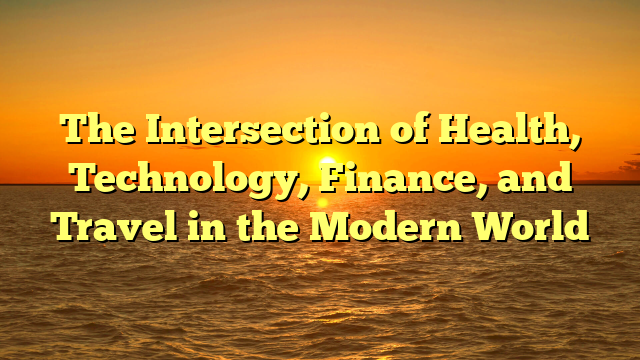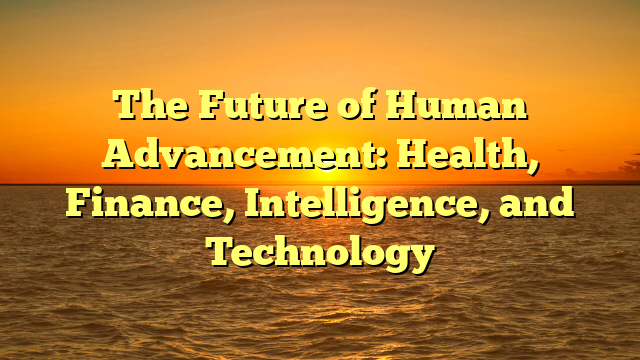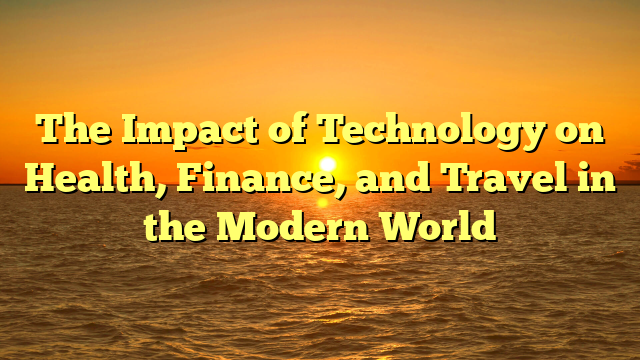In today’s rapidly evolving world, the fusion of health, innovation, economic growth, and exploration is reshaping how we live, work, and experience the world. These four sectors are interconnected in ways that offer unprecedented opportunities for improvement, but they also present unique challenges. As new innovations continue to emerge, it is important to explore how they are transforming our daily lives, influencing financial decisions, and enhancing the ways we stay healthy, connected, and engaged with the world around us.
Health and Technology: A Revolution in Well-being
Technology has played a significant role in advancing the field of medicine. Over the past few decades, we have witnessed the emergence of wearable devices, mobile applications, and telemedicine services, all designed to improve well-being. These tools offer individuals the ability to monitor their health metrics such as pulse, blood sugar, and even sleep patterns in real time. samosir88 can be sent to medical professionals, ensuring swift diagnosis and care.
Additionally, artificial intelligence (AI) is transforming the healthcare landscape by providing doctors with data-driven insights that enhance decision-making. AI algorithms are capable of detecting patterns in medical data that may not be immediately apparent to the human eye, enabling early detection of diseases and customized therapies tailored to an individual’s unique genetic makeup.
Furthermore, the rise of telehealth has made healthcare more accessible than ever before. Through video consultations, patients can receive professional advice without the need to travel to a clinic. This is especially beneficial in rural or underserved areas where access to healthcare facilities might be limited. By using smartphones, individuals can consult with doctors at the touch of a button, helping to break down geographical barriers and reduce healthcare costs.
Finance in the Age of Technology
The integration of technology into the financial sector has drastically changed how we manage money, invest, and plan for the future. The rise of digital banking, mobile payments, and cryptocurrency has transformed the way we interact with our finances. Mobile apps like PayPal, Venmo, and Apple Pay allow users to make instant transactions with just a few taps on their smartphones, providing convenience and flexibility for both consumers and businesses.
Cryptocurrency, such as Bitcoin and Ethereum, has introduced a new dimension to the financial world. These digital currencies operate independently of traditional banks, offering an alternative to fiat currencies. Cryptocurrencies have gained traction due to their decentralized nature, enhanced security features, and the potential for high returns on investment. However, they also come with risks, such as volatility and regulatory uncertainties, which investors must carefully consider.
Furthermore, fintech companies have created platforms that enable individuals to invest in stocks, bonds, and other assets without the need for a traditional broker. Robo-advisors, for instance, use AI to automatically manage investment portfolios based on an individual’s risk tolerance and financial goals. This democratization of finance has opened up new opportunities for individuals to grow their wealth and make informed financial decisions.
In addition, mobile banking and online lending have expanded financial services to populations that were previously excluded from the traditional banking system. In emerging markets, where access to banks is limited, mobile payment systems like M-Pesa have enabled millions of people to send and receive money, pay bills, and even save for the future, all through their mobile phones.
The Changing Landscape of Travel
Travel has also been profoundly impacted by technological advancements. In the past, booking a flight, hotel, or tour package often involved lengthy phone calls and time-consuming research. Today, travel apps and online platforms like Expedia, Airbnb, and Skyscanner have simplified the booking process, allowing travelers to find the best deals and plan their trips with ease. These platforms use AI and machine learning algorithms to provide personalized recommendations based on a traveler’s preferences, past behavior, and budget.
Furthermore, the advent of smart luggage and travel accessories has made travel more convenient and efficient. Smart luggage, equipped with GPS tracking, built-in scales, and charging ports, ensures that travelers can keep track of their belongings and avoid overweight baggage fees. Travel apps also provide real-time updates on flight delays, gate changes, and weather conditions, helping travelers stay informed and adjust their plans accordingly.
One of the most exciting developments in the travel industry is the rise of virtual and augmented reality. These technologies are being used to offer immersive travel experiences without leaving home. Virtual reality (VR) enables individuals to explore destinations, museums, and landmarks from the comfort of their living rooms, providing a taste of adventure for those unable to travel physically. Augmented reality (AR) is enhancing the travel experience on-site by overlaying digital information on the real world. For example, AR apps can provide historical context or highlight points of interest when visiting landmarks, making travel more engaging and informative.
Moreover, sustainability has become a significant focus in the travel industry. As global awareness of environmental issues rises, travelers are seeking more eco-friendly and sustainable options. Companies are responding by offering carbon offset programs, sustainable tourism experiences, and environmentally conscious travel products. Technology is playing a crucial role in helping the industry become greener by promoting green energy, reducing waste, and optimizing routes to reduce fuel consumption.
Integrating Health, Technology, Finance, and Travel
The convergence of health, technology, finance, and travel creates exciting new possibilities for individuals and businesses alike. For instance, digital health platforms are beginning to integrate financial tools, allowing individuals to not only track their health but also manage the cost of medical treatments, insurance, and prescriptions. Similarly, travel companies are leveraging technology to offer packages that promote healthy lifestyles, such as wellness retreats, fitness-focused vacations, and eco-friendly tourism options that support both the individual and the planet.
Furthermore, financial institutions are utilizing mobile applications to provide health insurance plans that are more personalized and accessible. By using data from wearable devices and health apps, insurers can offer better pricing and coverage based on an individual’s lifestyle, creating a more tailored experience. This fusion of sectors is driving a more holistic approach to personal well-being, financial security, and global exploration.
Conclusion: A Brighter Future Ahead
The intersection of health, technology, finance, and travel is forging a path toward a more connected, efficient, and sustainable world. As these sectors continue to evolve, individuals will benefit from smarter, more accessible solutions that improve their quality of life. Whether through advances in medical technology, the rise of digital currencies, or the ease of planning travel, the future holds exciting opportunities. The key will be to continue embracing innovation while being mindful of the challenges that come with it. By doing so, we can build a future that is not only more convenient and efficient but also healthier, more financially secure, and enriched by the ability to explore the world in ways previously unimaginable.
The Intersection of Health, Technology, Finance, and Travel in the Modern World


